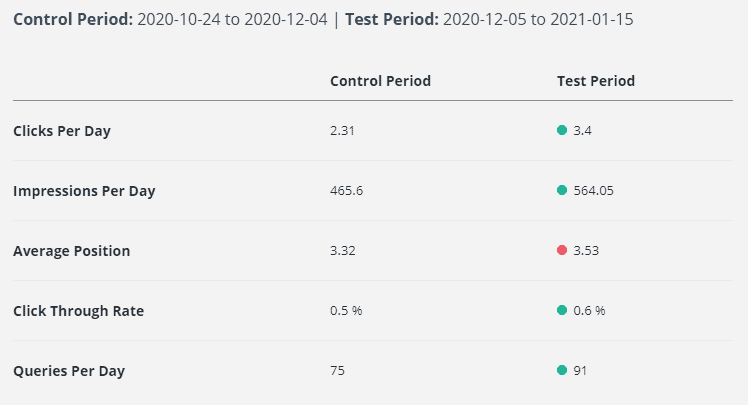Editor’s note: This blog was originally published in 2020 and has been updated for accuracy and best practices.
As websites and online businesses grow in complexity, so do the marketing audits needed to keep them up to speed.
Today, it’s not enough to conduct a single search engine optimization (SEO) audit to analyze your business’s digital health. Instead, you need a comprehensive audit that includes several smaller audits of individual aspects of your digital marketing strategy.
With ever-changing SEO standards, eCommerce brands today must be continuously updating and maintaining their sites throughout the year. We recommend auditing specific aspects at different times, to align with varying development cycles and allow for continuous improvement.
So, with so much to analyze, how does one get started?
In this guide, we’ll cover everything required in a comprehensive audit that keeps your business competitive throughout the year.
Table of Contents
What is a Digital Marketing Audit?
Simply put, a digital marketing audit analyzes every aspect of your marketing plan in a detailed and comprehensive way. The end goal: Provide actionable steps to internal teams, identifying where to best focus their resources.
It’s impossible for teams to stay on top of changing algorithms and find leaks within their business ecosystem. An audit identifies these problems and uncovers profitable areas of opportunity, saving marketers time and energy.
With this in-depth, 10,000-foot view of what’s going on with your website, your team can more efficiently allocate development resources and budgets to double down on what’s working — or fix any diagnosed performance issues.
Which Metrics Should Be Evaluated?
Every audit will be different, based on a business’s specific needs and goals.
However, your audit should always analyze the most important factors for driving business growth, such as:
SEO Metrics
- Organic Traffic
- Keywords
- Page Speed
- Indexability
- Backlink Profile
- Low-quality Pages
PPC Metrics
- Cost Per Click
- Quality Score
- Click-Through Rate
- Cost Per Conversion
Analytics Metrics
- Goals
- Conversions
- Revenue
- Traffic Sources
Conversion Rate Metrics
- Click-through rate
- Pages per session
- Time on site
- On-Page Events Tracking
By no means is this list exhaustive. But, it’s a good place to start when developing your personalized digital marketing audit checklist.
Types of Digital Marketing Audits
Now, let’s go into a little more detail with each of these categories.
Technical SEO Audit

A technical SEO audit identifies any problems that prevent your website from ranking on search engine result pages (SERPs). We recommend conducting this audit at least once every 12 months. (In fact, it’s the first service we complete for any new SEO client.)
This audit should evaluate:
- Crawl Errors
- HTTPS Status Codes (301, 404, 5xx)
- Site Speed
- Mobile Friendliness
You should also analyze keyword use and on-page SEO optimization factors (title tags, meta descriptions, headers, and content), although this will be done in more depth during your content marketing audit.
If you’re not experienced with technical SEO, we recommend hiring an agency to complete this step. Our strategists can identify all high-impact issues and recommend the most efficient fixes for your site.
When to Perform a Technical SEO Audit
As mentioned above, we recommend conducting a technical SEO audit every six to 12 months. But, if you’ve made any major site changes recently, you’ll need to move up that timeline.
Remember: Search engines update algorithms often. If you’re not on top of your site’s issues (especially after a major site update), any existing penalties can create a hole that’s difficult to crawl out of.
In addition to running mini audits on a monthly basis, perform a technical SEO audit after:
1. You launch a new site.
Most of this analysis should be done while your site is in development, but we always recommend conducting a new audit shortly after the new site launches.
Things don’t always work the same once the site is “live.” For example, crawlers often find new routes to URLs that shouldn’t be indexed. Don’t make an assumption that you regret when your traffic tanks.
2. You migrate your site.
Whether you’re moving from HTTP to HTTPS or .org to .com, rewriting the URL structure, or just changing the taxonomy of the site, you always need to conduct a post-migration audit.
You can follow our five-step migration process to minimize any lost rankings. Or, if you want an expert to handle it all, you can work with our SEO team for pre-migration support and a comprehensive post-migration website audit.
3. You have a sudden loss in traffic.
Algorithm changes and penalty analysis play large roles in SEO audits. The key: Perform the audit and implement fixes as soon as possible, to minimize any further traffic drops.
In this situation, timing is critical to site recovery. The longer you wait, the more desperate (and ineffective) your solutions will become.
Use our traffic drop checklist and our algorithm core update guide for initial analysis.
4. You hire a new SEO.
Sometimes, after years of working on a single website, it becomes easy to miss the forest for the trees. A new set of eyes may be just what you need to break through a plateau or reverse a slow decline in traffic.
Contrarily, you don’t always have to make a full-time hire to get that new perspective. An SEO agency can perform a one-time technical audit to evaluate your site and uncover new growth opportunities. (You can request a free proposal from our team anytime.)
Content Marketing Audit

If your brand and website has been around for more than a few years, and you haven’t performed a full content inventory and audit yet, there’s no time like the present.
How often do you post new blogs on your site, only to move on and never revisit them again? (Don’t worry: You’re not alone.) When left untouched, your content can become stale and outdated, especially in the eyes of Google. But, by updating your content periodically, you can actually have a bigger SEO impact than publishing brand-new content every day.
Your website content audit should analyze your entire catalog, from which you create a plan to improve, remove, or leave certain pages as is.
To make those decisions, we recommend reviewing the following criteria:
- Organic Traffic
- Organic Keywords
- Clicks from Search
- Impressions from Search
- Backlinks
- Social Shares
Get started with our free eCommerce Content Audit Toolkit today.

To make the most out of your content refresh strategy, keep your entire content strategy in mind, too. Evaluate your social media marketing, email marketing, and other promotional channels. Which are working best, and which need some more love and attention from your team?
Remember: Your website content is only part of the online marketing puzzle. To see real growth, you’ll need a multi-pronged approach that incorporates every step of the buying cycle.
When to Perform a Content Audit
A content audit can be done annually and still deliver big results for your business. After performing single audits, we’ve seen clients grow organic traffic transactions by 87% and revenue by more than 96% YOY.
Just like with a technical SEO audit, there are situations that demand an additional audit outside your annual report:
1. You’re preparing for a site migration.
We recommend conducting a full content inventory and audit before any website migration.
The inventory gives you a snapshot of URLs and content as they were before the migration, which helps to troubleshoot any post-migration traffic losses or other issues. The audit allows you to cut or consolidate superfluous content before the migration, ensuring a better site at launch.
2. You’ve completed a site migration.
Don’t forget the post-migration analysis, either. Developers don’t always implement everything correctly, so a post-migration audit confirms that recommendations were followed and your content is still in good shape. was completely botched because none of the recommendations were followed.
For more tips on exactly what to look for, check out our content audit strategies for common scenarios, sorted by website size.
3. You’ve experienced a steady decline in traffic
If your site traffic has been declining over the course of a year — but you’ve been publishing content consistently — then a content audit is necessary.
Often, situations like index bloat or outdated pages can cause lost rankings. An audit can help you turn the sinking ship around. Remember: The longer you wait to find a solution, the more your traffic will drop.
4. Your important pages suddenly drop from rankings.
Modern SEO knowledge says that 20% of our website content drives 80% of our results. Therefore, there are important landing pages on your website that demand more attention than others.
If a certain page on your site drives a large portion of your business, sudden drops in search rankings can be debilitating — and you need to know how to get it all back. A content audit can evaluate the biggest issues quickly.
Paid Advertising (PPC) Audit

There is no such thing as “set it and forget it” when it comes to paid marketing campaigns. If you ignore your campaigns for long periods of time by setting a “comfortable” budget, you’re missing out on key opportunities to grow your accounts.
A PPC audit ensures you’re optimizing your available budget and focusing on the right metrics for your target audience and business goals, which can include:
High-Funnel KPIs
- Pages per Session
- Time on Site
- Bounce Rate
Mid-Funnel KPIs
- New User ROAS
- Assisted Conversions
- Cost Per Acquisition
- Conversion Rate
Low-Funnel KPIs
- Transactions
- ROAS
When to Perform a PPC Audit
Standard practice says that a PPC audit should be performed every three to six months. Regularly scheduled audits allow you to step back, look at your account from a high level, dig down deeper, evaluate performance, discover trends and problems, and come up with plans of attack.
In addition to our recommended continuous optimization, there are a few trigger points that indicate you may want to conduct a full-scale PPC audit or paid advertising campaign review.
1. Your CPA costs go up dramatically or conversion rates drop.
A spike in CPA could mean all sorts of things: Quality scores could’ve gone down, or strong new bidders could have entered the marketplace. Depending on how you calculate an “acquisition,” it could also mean there’s a roadblock in the conversion funnel on your site.
2. You’ve hired a new PPC analyst or agency.
As with any marketing activities, a fresh set of eyes on your accounts is always a good reason for a comprehensive audit.
3. New ad features become available.
Not every Google Ads update necessitates a full-scale PPC audit, but important features — like structured snippet extensions, remarketing lists, and expanded text ads — are all worth incorporating as soon as possible.
Early adoption is a massive advantage when it comes to making your ads stand out in the search results.
Analytics & Tracking Audit

This is arguably the most important aspect of a comprehensive digital marketing audit. After all, if you’re not tracking your data accurately, any changes you make to your strategy based on that data will be worthless.
There are two major pieces to auditing analytics.
First, are you tracking the right things in the right ways? This is more of a strategic-level view of analytics from the perspective of overall business needs.
Secondly, is your implementation correct? Some questions to ask yourself: Are your tracking codes added to all pages? Are things firing when they should? Is the data accurate?
Only once you’ve answered “yes” to all of these questions can you be sure your analytics are working properly for your business goals and needs.
When to Perform an Analytics Audit
Your reporting is only as good as the data you collect. So, we recommend running a thorough analytics audit every 12 months. This ensures confidence in the data being provided by your analytics packages.
You should also consider running an ad hoc analytics audit when:
1. You’ve launched a new site or completed a site migration.
After you launch a new website, it’s a good time to double-check all your Google Analytics goals to ensure everything is being tracked as planned.
As mentioned above, certain things can fall through the cracks during site migrations, so it’s best to perform a post-migration audit, too — to ensure your tracking code is in place in all the right locations.
2. Your business has changed its objectives.
As your digital strategy changes, so should the methods that you use to track metrics and results.
For example, if you’ve never tracked email acquisition, and your new marketing strategy relies heavily on inbound marketing concepts like lead nurturing, it might be time to re-evaluate how this goal is being tracked.
3. New tracking solutions become available.
Google Tag Manager was a game-changer when it comes to analytics, as was the Universal Analytics tracking code when it was first launched.
Bottom line: When something major changes in regard to your analytics tracking software, take another look under the hood and see how you can implement it into your strategy.
Start your Google Analytics audit with our helpful guide.
Conversion Rate Optimization (CRO) & UX Audit

Conversion rates and user experience are closely related. Without a stellar buyer experience, your conversion numbers will likely suffer, so it’s important to consider both when conducting this aspect of your audit.
You don’t necessarily need a UX department to conduct this audit, either. Often, conversion rate optimization strategists have a good grasp of UX best practices, and they can make recommendations based on the conversion data they’re seeing from your site.
Don’t have either expert on your team? Our CRO strategists are always happy to evaluate your site and provide a personalized strategy for your business.
When to Perform a CRO & UX Audit
At Inflow, we strongly believe in and encourage continuous improvement practices.
CRO isn’t something you do once or even just once in a while. For the best results, your team should be continually brainstorming, testing, and analyzing strategies on your site to keep pace with changing user behavior and expectations.
That said, there are certain times when a CRO audit is more crucial than others:
1. You’ve launched a new site or completed a migration.
CRO and UX should be factored into the new site or redesign process from the very beginning. This consideration typically occurs during the concept and wireframing processes, but unfortunately, it often stops once design mock-ups have been approved.
Not everything translates from mock-up to live site. A CRO expert should always review the new site after launch, conducting exit survey analysis and live site reviews.
Similarly, every platform migration should include a new CRO audit, because every platform has its own idiosyncrasies. For example, if you’re migrating to Magento, there are a few optimizations to keep in mind. Without a trained eye, these can go unaddressed and hamper your site’s success.
2. You’ve hired a new CRO strategist or agency.
Conversion rate optimization is part science, part art. In short, it is a craft — and each craftsperson brings unique experiences and insights to the job.
Like with other audits, bringing on a new CRO or UX expert is a good time to reconsider existing strategies and discuss new ideas to test.
3. Your business has changed or added product lines.
Price points and other factors can have a dramatic impact on how shoppers make purchasing decisions. So, any time significant changes are made to your product offerings, new rounds of testing should be done to ensure optimal conversions.
4. A new competitor has entered the market.
Sometimes, a new competitor can disrupt your conversion funnel.
For example, let’s say your price point was your best differentiator in the marketplace and the feature you called out most on your website. A new competitor with lower prices may require you to shift your value propositions to keep customers engaged.
5. Conversion rates significantly drop.
Obviously, any major dip in your website’s conversion rates is a reason to re-evaluate your CRO strategy.
This could mean a full CRO & UX audit — or something as simple as fixing a broken link in the conversion funnel. But, until you identify the issue, you’ll be losing out on big profits, so don’t delay.
Start your CRO digital audit with our list of eCommerce conversion optimization best practices.

Wrapping It Up: Getting Started with Your Audits
When you’re a digital marketer, it’s important to continually educate yourself on exactly what you need to grow your business. Your development resources aren’t infinite, and your internal team will often focus on day-to-day digital marketing efforts, rather than the big picture.
Audits can take up a lot of time throughout the year — but they’re not something to be ignored. As you plan yours, be sure to save time for implementation and to ensure your recommendations are implemented correctly. After all, an audit is no good if the resulting strategies aren’t used efficiently.
Here at Inflow, we recommend performing regular audits to avoid issues compounding over time and negatively affecting your website beyond recovering. And, by auditing every link in your marketing channels, you’ll be much more likely to see continual growth year after year.
If a digital marketing audit of this scale doesn’t fit into your daily schedule, let our marketing agency handle it. Whichever channels you’re interested in, contact our experts today for a personalized audit addressing the biggest opportunities for your online store. You won’t be disappointed.






